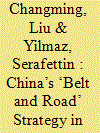|
|
|
Sort Order |
|
|
|
Items / Page
|
|
|
|
|
|
|
| Srl | Item |
| 1 |
ID:
136626


|
|
|
|
|
| Summary/Abstract |
In his seminal work, Gramsci, Hegemony and International Relations, Robert W. Cox reflects upon Gramsci’s political ontology. Analyzing how Gramsci reasoned about the relationship between civil society and the state, he explores the ways in which Gramsci’s conceptualization could be adapted to international relations studies. With a particular focus on the concept of hegemony, Cox maintains that just as hegemonic relationships are formed among social classes within the state, similar structures may be found in the larger global framework. By adopting the Coxian approach, this essay attempts to apply Gramsci’s notion of a historical bloc to the analysis of the post-Cold War world order and the rise of China as a viable architect of a new international governance model. It thus maintains that the contemporary global economic and political developments indicate the ongoing formation of an alternative historical bloc which, despite currently falling short of Gramsci’s conceptualization of imminent radical change, signifies major implications for inter-state relations and world peace and security
|
|
|
|
|
|
|
|
|
|
|
|
|
|
|
|
| 2 |
ID:
158089


|
|
|
|
|
| Summary/Abstract |
The focus of this article is two-pronged. First, it highlights China’s ‘One Belt, One Road’ (OBOR) initiative as a Eurasia-centred project that, distinct from the twentieth-century Eurasianism, aims to introduce a new comprehensive integrationist agenda to the Eurasian strategic landscape. Second, it compares the US-led Euro-Atlanticism and the emerging Eurasianism, holding that while the former has historically stressed security over development (development is seen as contingent on the establishment of a hard security regime), the latter prioritises development over security (security is viewed as contingent on the establishment of an inclusive economic regime). Thus, this research argues that, if implemented successfully, OBOR could challenge Euro-Atlanticism as the long-held normative paradigm of interstate relations by offering a systemic alternative.
|
|
|
|
|
|
|
|
|
|
|
|
|
|
|
|
| 3 |
ID:
168228


|
|
|
|
|
| Summary/Abstract |
In this article, we examine the energy nexus in China–Russia strategic relations. We find that, over the past few years, the two countries have taken concrete steps to reinforce partnership in other strategic issue areas. Energy, in this respect, has been utilized as an effective policy instrument to deal with immediate challenges such as the Ukrainian crisis and the South China Sea disputes. We argue that cooperation in energy helps the two countries adopt common positions toward non-energy related issues and facilitate long-term deeper interaction. We thus maintain that energy will occupy an increasingly central position as China and Russia continue to seek to align their strategies more comprehensively against the backdrop of the evolving geopolitical environment by working to overcome existing disagreements and exploring new areas of cooperation.
|
|
|
|
|
|
|
|
|
|
|
|
|
|
|
|
|
|
|
|
|